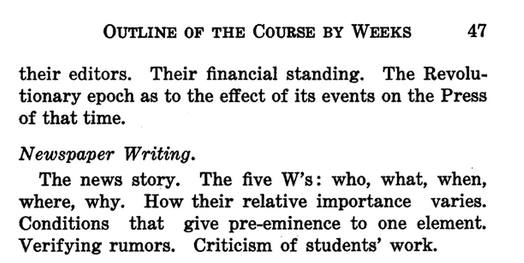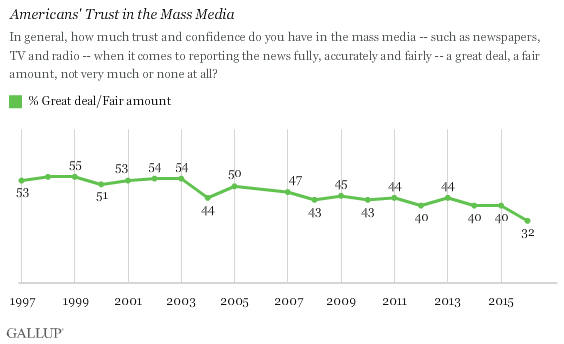Of Course the Media Sucks . . . and Everyone Should Know Why
Since prior to 1917 in the United States, the “Five W's” were taught, as standard fare, in high school journalism classes. See Leon Nelson Flint, Newspaper Writing in High Schools, Containing an Outline for the Use of Teachers, University of Kansas, 1917, p. 47.

It doesn't take long at all to see why a goodly portion of media today could not possibly pass a high school journalism class. As a result, the trust of media has continually dipped, and it couldn't be more obvious. On September 14, 2016, GALLUP reported, “Americans' Trust in Mass Media Sinks to New Low.” It has been tracked for years (since 1972 by Gallup) and mass media trust continues to erode. Americans don't always agree on much, but the majority of Americans do not trust the media, and why would they?

If you want trust, you have to earn it. Calling something a “report” using a fake name, assumed name, or screen name is no reporting at all. It isn't honest: it is flunk-level trash before it begins. It couldn't be much lower as a form of information to say “I heard,” “somebody said,” or “an official said.”
Using “sources” or just saying “reportedly” is not just bad form, it does not pass any reasonable threshold for hard news reporting. Yale Center for Teaching and Learning discusses scholarly sources.
"Scholarly sources are those that have been approved by a group with recognized expertise in the field under discussion. Books published by University Presses fall into this category, as do articles published in peer-reviewed journals—journals where the editors send pieces out to be read by experts in the field before deciding to publish them. The Yale library subscribes to several databases that specialize in scholarly sources (such as Academic Search Premier). . .
If you use sources for facts or ideas in your writing, some research projects will demand that you rely heavily if not exclusively on scholarly sources. Scholarly sources are not infallible, but their publication process includes many steps for verifying facts, for reducing political bias, and for identifying conflicts of interest (for instance, for informing readers when a drug company has funded research on its own product).”
Yes, the media sucks, but it should be of no surprise to anyone-- including the media themselves. The failure to use honestly named, scholarly sources in the media is pervasive. The gross failure to use honestly named, popular sources is perhaps even worse.
Copyright 2017 by Randy Wakeman. All Rights Reserved.











